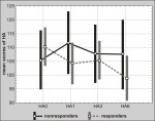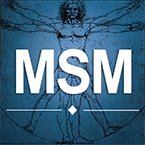Predictive significance of TCI-R for antidepressant treatment
Radovan Hruby, Gabriela Nosalova, Sabina Hruba
Med Sci Monit 2010; 16(8): CR383-388
ID: 881106
Available online:
Published: 2010-08-01
 Background: The aim of this study was to investigate the significance of the Temperament and Character Inventory – Revised (TCI-R) dimensions of personality for prediction of treatment outcome in depressed outpatients during 6 months of antidepressant treatment.
Background: The aim of this study was to investigate the significance of the Temperament and Character Inventory – Revised (TCI-R) dimensions of personality for prediction of treatment outcome in depressed outpatients during 6 months of antidepressant treatment.Material/Methods: Thirty outpatients were treated for mild or moderate depressive episode, current mild or moderate episode of reccurent depressive disorder or mixed anxiety and depressive disorder (ICD-10). The intensity of depression was assessed by the Montgomery-Asberg Depression Rating Scale (MADRS) at the beginning of treatment and then after the 1st, 3rd and 6th months of treatment. The personality dimensions were assessed by the TCI-R at the same time points as the MADRS. Differences in TCI-R dimensions between treatment responders (≥50% decrease in MADRS score after 6 months of treatment) and nonresponders (<50% decrease in MADRS score) were compared by repeated measures analysis of variance (ANOVA). Predictive value for the treatment outcome was assessed by Spearman‘s correlation coefficient.
Results: The predictive significance for treatment outcome (Spearman‘s correlation coefficient) was identified for reward dependence (RD) (R=–0.44) and harm avoidance (HA) (R=0.46) dimensions. Treatment responders and nonresponders significantly differed (ANOVA) in HA (p<0.05), showing a decrease in total mean HA score only in responders during treatment.
Conclusions: Our findings showed predictive significance of the TCI-R dimensions HA and RD for long-term antidepressant treatment outcome.
Keywords: Personality Inventory, Predictive Value of Tests, Depressive Disorder - drug therapy, Character, Avoidance Learning - drug effects, Antidepressive Agents - therapeutic use, Analysis of Variance, Psychiatric Status Rating Scales, Temperament - drug effects

